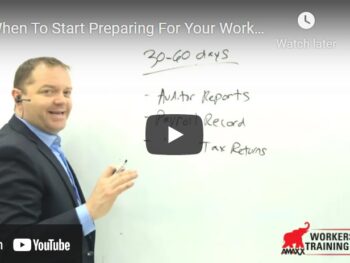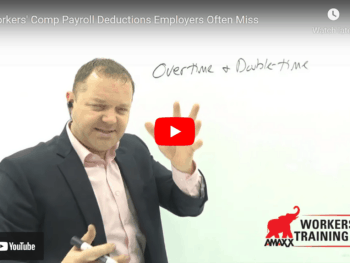Deer Season Can Equal Spike in Work Comp Claims
Fall has arrived. Time is say goodbye to days at the beach and trade in your golf clubs for shotguns or bows and arrows. In the early Fall, whitetail deer season is a tradition among many families. These hunters dress up in their camouflage fatigues and paint their faces in order to try and bag their trophy buck. It is a time to become one with nature and to spend time with family and friends at the deer cabin or the family cottage.
What does this mean for employers? The answer is simple: a spike in work comp claims. Although I have not seen many formal statistical studies, I know from years of experience that this time of year creates spikes in lost work production time due to worker absences. I know of many people, hurt or not, that would drag themselves out to their deer blinds no matter what type of pain they are experiencing. Many people hold deer season in very high regard due to the tradition of families spending time together away from home roughing it in rural areas around the country. So what can you do to protect yourself from questionable comp claims around this time of year?
Click Link to Access Free PDF Download
“Workers’ Comp Claims Review Checklist: 9 Must-Have, Serious-Impact Elements”
Do a Thorough Investigation
Be it this time of year or not, the best defense you can have in any comp claim is a thorough investigation. Some workers may plot to have a “work injury” around this time of year so they can get the allotted time off to go hunting. It may start off simply enough in the form of casual conversation around the water cooler talking about an injury that may or may not have occurred. Bill may say to you “Boy my back sure is sore today, I think I may have overdid it the other day unloading inventory off the truck.” You ask them if they are ok and if they need treatment. Oftentimes they will say they do not, and they do not want to file a claim or anything, since this “injury” should get better on its own. But they will let you know if they need treatment or need to file an actual comp claim for the “injury.”
Then a month later when deer season comes around, Bill heads up to your office and says he has been receiving treatment and his doctor says he needs to take some time off of work. In addition, he should file a comp claim so his bills can be paid. Be this a work injury or not, you still need to complete your investigation by sitting Bill down and asking him the normal questions about the injury, getting his medical information from his doctor, and asking about witnesses and other pertinent information. Be sure to follow up and be as thorough as possible. Just because Bill said he was injured at work a month ago doesn’t make that entirely true.
Gather the Facts
Be honest when Bill comes to your office asking you if you remember him mentioning an injury to you a month ago. Sometimes employers are afraid to say no, fearing that they could get in trouble for not documenting something. Chances are you may not remember, and that is OK. But if you want to be more proactive, when an employee comes to you and mentions an injury, no matter how insignificant it may be or however casual the conversation, you should always jot a note down and put it in his personnel file for future reference. You do not have to do a full blown investigation at that time, but it is a good idea to get some general details and get some potential witness names, then go talk to those witnesses and see if Bill’s story checks out. If you have that feeling that something isn’t right, file the claim and send him to your occupational clinic and have the doctor do an evaluation. Chances are if this injury isn’t entirely legit, the doctor will release Bill from care without any work restrictions. When this happens, it automatically derails Bill’s idea that he can bring this injury back up at a future date.
Be a Proactive Listener
No matter what time of year, you should always be a good listener. You spend a lot of time with your workers day after day, year after year. You may already know the people that are avid in outdoor activities such as hunting, fishing, snowmobiling, etc. You may know that Chuck has a cottage up north where his family goes a few times a year to hunt or vacation. In addition, other workers may unintentionally spill the beans on their coworkers. If you are in the lunchroom and hear a conversation between some coworkers about another worker “planning some extra time off around the holidays by saying they got hurt at work” then it is probably a good idea to make a note of that.
Now this is not to say that you can deny a claim based on some hearsay you obtained one day a few months ago. But, it may remind you that someone knew this was coming, and it certainly won’t help them try and pull the wool over the eyes of their adjuster that is handling the claim. Little tidbits of info like that are priceless to an adjuster. That information alone can be what it takes to get the adjuster to take an extra close look at the claim, and sometimes that is what you need in good overall aggressive claims handling. Perhaps Bill really did get hurt, and if that is the case and all of his details check out, then fine. But if not, and the claim is questionable, then you may have prevented financial leakage by paying for a work injury claim that was never work related to begin with.
Accommodate Work Restrictions
Nothing is better at stopping a mini-vacation from work like not being able to be off in the first place. Your workers are not dumb. They know by being around the work floor that anytime someone gets hurt, they are never back to work until they are fully released from their doctor. This is ammo they can use against you down the road when it is their time to claim a work “injury.” By being flexible and accommodating medical restrictions whenever possible, workers know that just because they may get injured it doesn’t mean that they will be off of work until the doctor releases them from care.
One of the best deterrents against questionable soft tissue work injury claims is providing light duty work while they rehab from said “injury.” Workers know that they cannot cash in easy time off of work just by claiming they are hurt, and the more examples they see of this the better.
Summary
The arrival of deer season will possibly create a spike in work comp claims around your workplace. But by taking notes, gathering facts, being a good listener, and accommodating medical restrictions you can take a leg up on your potential workers planning an extended vacation to go bag their trophy buck. In the end, these claims cost you money in the form of dollars spent and possible increased insurance premiums. By following the guidelines above, you can keep these workers in check and focus on more important issues.
Author Rebecca Shafer, JD, President of Amaxx Risk Solutions, Inc. is a national expert in the field of workers compensation. She is a writer, speaker, and publisher. Her expertise is working with employers to reduce workers compensation costs, and her clients include airlines, healthcare, printing/publishing, pharmaceuticals, retail, hospitality, and manufacturing. She is the author of the #1 selling book on cost containment, Workers Compensation Management Program: Reduce Costs 20% to 50%. Contact: RShafer@ReduceYourWorkersComp.com.
Editor Michael B. Stack, CPA, Director of Operations, Amaxx Risk Solutions, Inc. is an expert in employer communication systems and part of the Amaxx team helping companies reduce their workers compensation costs by 20% to 50%. He is a writer, speaker, and website publisher. www.reduceyourworkerscomp.com. Contact: mstack@reduceyourworkerscomp.com.
WORKERS COMP MANAGEMENT MANUAL: www.WCManual.com
Do not use this information without independent verification. All state laws vary. You should consult with your insurance broker or agent about workers comp issues.
©2012 Amaxx Risk Solutions, Inc. All rights reserved under International Copyright Law. If you would like permission to reprint this material, contact us at: Info@ReduceYourWorkersComp.com.












